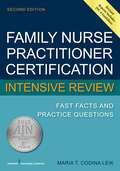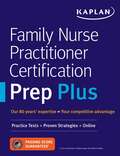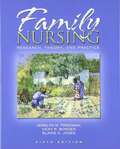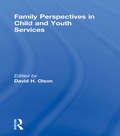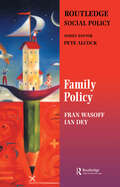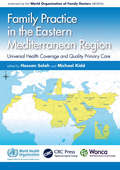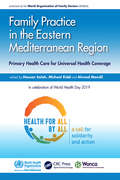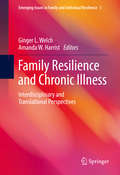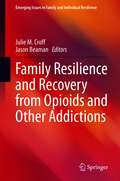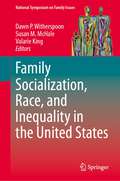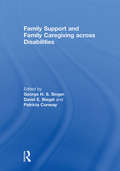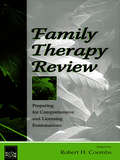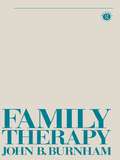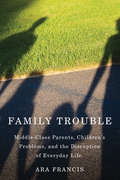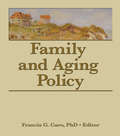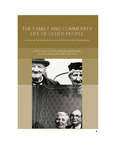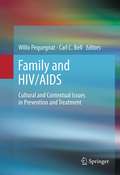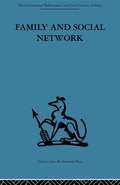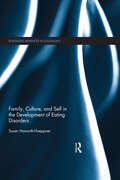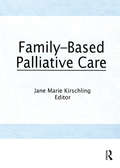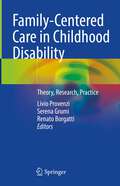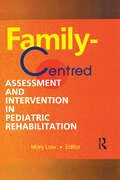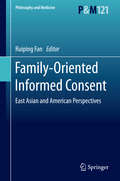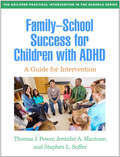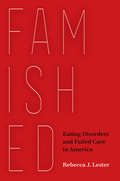- Table View
- List View
Family Nurse Practitioner Certification Intensive Review: Fast Facts And Practice Questions
by Maria T. Codina LeikThe second edition of this acclaimed FNP review continues to promote efficient, time-saving study by synthesizing the key content needed to pass the NP Certification Exam into a concise, well-organized format. Using test-taking strategies meticulously developed by the author, the Review provides unique question dissection techniques, targeted key content review, 600 in-depth practice questions, and detailed, current exam information in a fast facts style. This second edition includes new chapters on pediatrics and adolescence and an extensive new section on geriatrics that encompasses body/metabolic changes, common disorders, and hospice/ethical considerations. The book also presents an expanded, intensive pharmacology review, 100 new exam questions, and is the only review to offer a new research chapter providing elements of research needed for E-B practice. The book reviews the complete lifespan from pediatrics to geriatrics and including pregnancy, and covers non-clinical content including ethics, medico-legal issues, advanced practice law, and reimbursement guidelines. The review of primary care disorders is organized by body system. The content is applicable for certification exams for both the ANCC and the AANP.
Family Nurse Practitioner Certification Prep Plus: Proven Strategies + Content Review + Online Practice (Kaplan Test Prep)
by Kaplan NursingKaplan's Family Nurse Practitioner Certification Prep Plus is your step-by-step guide to scoring higher on the FNP exam. We distill the exam blueprint into short, focused lessons to give you efficient, effective prep so you can ace the FNP exam. This edition offers review and practice for both FNP exams—American Academy of Nurse Practitioners (AANP) and American Nurses Credentialing Center (ANCC).Realistic Practice800+ practice questions—in the book and online23 end-of-chapter practice question sets2 mini prep tests online, one for the ANCC test and one for the AANPDetailed rationales for each correct and incorrect answer choiceExpert GuidanceExclusive test-taking and study strategies that optimize your preparation/li>We know the test: Kaplan’s experts ensure our practice questions and study materials are true to the exam/li>We invented test prep—Kaplan (www.kaptest.com) has been helping students for 80 years, and our proven strategies have helped legions of students achieve their dreams.
Family Nursing: Research, Theory And Practice
by Marilyn Friedman Vicky Bowden Elaine JonesThis popular book addresses the full practice of family nursing—identifying the family as a whole—and teaches a holistic, philosophical approach. The reader is guided through generalized concepts and theoretical foundations, reality-based applications, case studies, thorough and updated discussions, assessment, and nursing diagnoses. Well-organized and complete, this edition includes foundations in family theory and family nursing—essential in preparing a comprehensive family nursing assessment and planning appropriate interventions. A four-part organization covers introductory concepts, theoretical foundations of family nursing, family nursing practice, and cultural diversity among families. For pediatric nurses, nurse practitioners, family counselors, clinical nurse specialists, and anyone planning for a career in family or community cursing.
Family Perspectives in Child and Youth Services
by Jerome Beker David OlsonThis timely book demonstrates the value and relevance of family-oriented programs in dealing with problems experienced by children and adolescents. Experts provide salient guidelines and recommendations for involving the family in the diagnosis and treatment of problems. In addition to providing current reviews of research, this practical volume describes various skill-building programs and therapeutic interventions that can be used in a variety of program and treatment settings. Designed for helping professionals who work with children and youth, Family Perspectives in Child and Youth Services will be most valuable for practitioners in social work, psychology, psychiatry, and child development.
Family Policy (The Gildredge Social Policy Series)
by Ian Dey Fran WasoffFamily Policy focuses on the main family activities that are of concern in social policy and social work. This book explores how families behave and questions the implications for policies and practice. Perceptions of and responses to family 'pathologies' - teenage pregnancies, family breakdown, family poverty and violence - are examined. Core issues in family policy are considered, to help students to understand and evaluate the family policies at the hear of Labour's welfare reforms. This will be a valuable text, particularly for HE students with little previous knowledge of family policy.
Family Practice in the Eastern Mediterranean Region WHO HB SPECIAL EDITION: Universal Health Coverage and Quality Primary Care (WONCA Family Medicine)
by Hassan Salah Michael KiddThis is the first book to analyze in depth the current causes of shortage of family physicians and the relative weakness of the family practice model in many countries in the Eastern Mediterranean Region. Focusing on engagement with the private health sector in scaling up family practice, the book explores why primary health care can make the difference and how it can be introduced and strengthened. Comparative experiences from around the world put the EMR in context, while the book also highlights where the EMR is special – in particular, the burden for health care of refugees and displaced persons, and the need of public-private partnerships.
Family Practice in the Eastern Mediterranean Region: Primary Health Care for Universal Health Coverage (WONCA Family Medicine)
by Hassan Salah Michael KiddThis joint publication from the World Health Organization (WHO) and the World Organization of Family Doctors (WONCA) provides a concise analysis of the state of family practice in the 22 countries spread over North Africa, the Middle East and Western Asia, i.e. the Eastern Mediterranean Region (EMR) in both English and Arabic. It shares perspectives and advice from global and regional leaders on how family practice can be introduced and strengthened in high-, middle- and low-income countries.
Family Resilience and Chronic Illness
by Ginger L. Welch Amanda W. HarristThis interdisciplinary volume offers theoretical, empirical,and practical insights into the strengths of families beset by chronic healthissues. Featuring topics that run the lifespan from infancy to late adulthood,its coverage reflects both the diversity of family challenges in long-termillness and the wealth of effective approaches to intervention. The component skillsof resilience in life-changing circumstances, from coping and meaning making tobalancing care and self-care, are on rich display in a framework for theirenhancement in therapy. The book's expert contributors include tools to aidreaders in the learning and teaching of concepts as they model respectful,meaningful research methods and ethical, non-judgmental practice. Among the topics covered: Helping families survive and thrive through the premature birth of an infant. Enhancing coping and resiliency among families of individuals with sickle cell disease. A family science approach to pediatric obesity treatment. Risk and resilience of children and families involved with the foster care system. Strengthening families facing breast cancer: emerging trends and clinical recommendations. The unfolding of unique problems in later life families. With its mix of practical and empirical expertise, Family Resilience and Chronic Illness: Interdisciplinary and Translational Perspectives has much tooffer both researchers in the family resilience field and mental healthpractitioners working with clients with chronic illness.
Family Resilience and Recovery from Opioids and Other Addictions (Emerging Issues in Family and Individual Resilience)
by Julie M. Croff Jason BeamanThe book examines the relationship between family resilience and recovery from substance use disorders. It presents information on etiology of substance use disorders within the family system as well as new research on resilience in addiction recovery. The book facilitates the development of evidence-based resilience practices, programs, and policies for those working or dealing with families and addiction.Key topics addressed include: Protecting workers from opioid misuse and addiction. Neuroscience-informed psychoeducation and training for opioid use disorder. New models for training health care providers. Role of families in recovery capital. Family Resilience and Recovery from Opioids and Other Addictions is a must-have resource for researchers, professors, and graduate students as well as clinicians and related professionals in family studies, public health, and clinical psychology and all interrelated disciplines, including behavioral health, social work, and psychiatry.
Family Socialization, Race, and Inequality in the United States (National Symposium on Family Issues #14)
by Valarie King Susan M. McHale Dawn P. WitherspoonThis book examines the ways in which families can address racial and ethnic inequalities and racism and the impacts of these systems on health, education, and other family and family member outcomes. It addresses the historical context of race and racism in the United States, ethnic-racial socialization in families of color, and White parents’ attitudes and practices related to antiracist socialization. Chapters describe structural racism, debunk the myth of racial progress, and explore the representation of race and racism in family research; provide a historical account of ethnic-racial socialization literature, propose a model of ethnic-racial socialization of Latinx families; describe how racial socialization can be used therapeutically; and address White normativity, expand models of White racial socialization and learning, and grapple with the complexities of antiracist socialization. Finally, the volume offers recommendations for the field of family research to meaningfully include race and racism as well as provides suggestions for translational work in this area related to policies, programs, and practice. Featured areas of coverage include:Ethnic and racial socialization among families of color.White racial socialization and racial learning.Antiracist socialization.Opportunities for family research on race and racism to be used to enhance family policies and intervention programming.Family Socialization, Race, and Inequality in the United States is a must-have resource for researchers, professors, clinicians, professionals, and graduate students in developmental psychology, family studies, and sociology, as well as interrelated disciplines, including demography, social work, prevention science, public health, educational policy, political science, and economics.
Family Support and Family Caregiving across Disabilities
by George H. S. Singer David E. Biegel Patricia ConwayFamily members provide the majority of care for individuals with disabilities in the United States. Recognition is growing that family caregiving deserves and may require societal support, and evidence-based practices have been established for reducing stress associated with caregiving. Despite the substantial research literature on family support that has developed, researchers, advocates and professionals have often worked in separate categorical domains such as family support for caregiving for the frail elderly, for individuals with mental illness, or for people with development disabilities. Family Support and Family Caregiving across Disabilities addresses this significant limitation through cross-categorical and lifespan analyses of family support and family caregiving from the perspectives of theory and conceptual frameworks, empirical research, and frameworks and recommendations for improvements in public policy. The book also examines children with disabilities, children with autism, adults with schizophrenia, and individuals with cancer across the life cycle. This book was published as a two-part special issue in the Journal of Family Social Work.
Family Therapy Review: Preparing for Comprehensive and Licensing Examinations
by Robert H. CoombsThis book offers a clear, readable overview of all the knowledge and skills those training as marriage and family therapists and counselors need to pass final degree program, certification or licensing examinations. It is organized into three sections: Basic Clinical Knowledge and Skills, Common Client Problems, and Career Issues. Each chapter includes challenging study questions that enable readers to assess their own level of understanding--15 true/false questions at the outset checking on baseline knowledge, 30 multiple-choice questions interspersed through the text underlining crucial points, and 10 provocative discussion questions at the end facilitating synthesis. Each chapter also provides a glossary of key terms and, in addition to references, annotated suggestions for further reading and Web site exploration. Students and trainees will find Family Therapy Review: Preparing for Comprehensive and Licensing Examinations a resource to which they will go on referring long after it has helped them through their examinations; faculty and established professionals will find it a useful one-stop summary of current thinking about best practice.
Family Therapy: First Steps Towards a Systemic Approach (Tavistock Library of Social Work Practice)
by John B BurnhamFamily therapy is a rapidly expanding field. This book introduces a range of concepts, skills and applications from a systemic approach. The first part sets out the theory and examines relationship types, the family life cycle, interactional sequences and different models of change. The next section puts the theory into practice. It describes verbal and non-verbal techniques which are used to elicit information and initiate change. The last part considers some of the necessary conditions for the successful integration and application of this approach in social work practice, illustrated by detailed case examples. A series of graduated exercises is designed to encourage readers to explore the theory and practice of family therapy in their own agencies.
Family Trouble
by Ara FrancisOur children mean the world to us. They are so central to our hopes and dreams that we will do almost anything to keep them healthy, happy, and safe. What happens, then, when a child has serious problems? In Family Trouble, a compelling portrait of upheaval in family life, sociologist Ara Francis tells the stories of middle-class men and women whose children face significant medical, psychological, and social challenges. Francis interviewed the mothers and fathers of children with such problems as depression, bi-polar disorder, autism, learning disabilities, drug addiction, alcoholism, fetal alcohol syndrome, and cerebral palsy. Children's problems, she finds, profoundly upset the foundations of parents' everyday lives, overturning taken-for-granted expectations, daily routines, and personal relationships. Indeed, these problems initiated a chain of disruption that moved through parents' lives in domino-like fashion, culminating in a crisis characterized by uncertainty, loneliness, guilt, grief, and anxiety. Francis looks at how mothers and fathers often differ in their interpretation of a child's condition, discusses the gendered nature of child rearing, and describes how parents struggle to find effective treatments and to successfully navigate medical and educational bureaucracies. But above all, Family Trouble examines how children's problems disrupt middle-class dreams of the "normal" family. It captures how children's problems "radiate" and spill over into other areas of parents' lives, wreaking havoc even on their identities, leading them to reevaluate deeply held assumptions about their own sense of self and what it means to achieve the good life. Engagingly written, Family Trouble offers insight to professionals and solace to parents. The book offers a clear message to anyone in the throes of family trouble: you are in good company, and you are not as different as you might feel...
Family and Aging Policy
by Francis G. CaroLearn how public policies can help families provide the care their elderly relatives needFamily and Aging Policy examines how public initiatives to assist the elderly in the United States, Canada, Singapore, Denmark, and Sweden can impact families who provide them with long-term care. For the majority of older people, the aging experience involves their families directly and indirectly, affecting income security, housing, and health care. This unique book addresses the aging issues that matter most to families struggling to deal with the demands of care giving and provides answers on how the public sector can help.As the traditional nuclear family becomes a memory and the notion of extended family disappears, the need for public interventions to help the elderly increases. A significant number of people grow old without families they can depend on. Others have families who want to help, but lack the financial means or the housing needed to provide care. Family and Aging Policy offers options on how families and formal services can share responsibilities, including how families can juggle jobs and care giving, the effects of the Family and Medical Leave Act, consumer-directed service options, community-based care programs, accessory dwelling units and zoning ordinances, and provisions for caregiver support in each of the 50 United States and the District of Columbia.Family and Aging Policy examines: extensive welfare programs in Sweden publicly funded home care programs in Denmark family-oriented social policies in Singapore shared responsibilities of families and formal services in Canada the Administration on Aging&’s National Family Caregiver Support program in the United States California Caregiver Resource Centers and much more!Family and Aging Policy is an invaluable tool for researchers and policy analysts working in family policy issues and as an essential supplemental text for course work in gerontology, sociology, family relations, and social work.
Family and Community Life of Older People: Social Networks and Social Support in Three Urban Areas
by Chris Phillipson Jim Ogg Miriam Bernard Judith and PhillipsFamily life has changed rapidly over te past fifty years and the number of people living longer increases year on year Family and Community Life of Older People revisits three areas (Bethnal Green in London, Wolverhampton in the Midlands and Woodford in Essex) which were the subject of classic studies in the late 1940s and 1950s and explores changes to the family and community lives of older people. The book examines issues such as:*changes in household composition*changes in the geographical proximity of kin and relatives*the extent and type of help provided by the family*contact and relationships with neighbours*relationships with friends*involvement in social and leisure activities*experiences of minority ethnic groups.These questions are explored through a unique set of data including census material, and survey data from interviews with over 600 older people. A key finding is that over the past 50 years we have moved from an old age experienced within the context of the family group to one shaped by personal communities in which friends may feature as significantly as immediate kin and relatives.Family and Community Life of Older People is a major contribution to the sociology of the family, of ageing, and of urban life and points up the social policy issues for an ageing society.
Family and HIV/AIDS
by Willo Pequegnat Carl BellThree decades into the HIV pandemic, the goals remain clear: reduce the number of infections,improve the health outcomes of those who are infected, and eliminate disparities in care. And one observation continues to gain credence: families are a powerful resource in preventing, adapting to, and coping with HIV. Recognizing their complex role as educators, mentors, and caregivers, Family and HIV/AIDS assembles a wealth of findings from successful prevention and intervention strategies and provides models for translating evidence into effective real-world practice. Chapters spotlight the differing roles of mothers and fathers in prevention efforts, clarify the need for family/community collaborations, and examine core issues of culture,ethnicity, gender, and diagnosis (e.g., minority families, adolescents with psychological disorders). Throughout, risk reduction and health promotion are shown as a viable public health strategy A reference with considerable utility across the health, mental health, and related disciplines,Family and HIV/AIDS will be a go-to resource for practitioners working with families, researchers studying at-risk populations, administrators seeking to create new (or evaluate existing)prevention and care programs, and policymakers involved in funding such programs.
Family and Social Network: Roles, Norms and External Relationships in Ordinary Urban Families (Reprint Series In Social Sciences)
by Elizabeth BottTavistock Press was established as a co-operative venture between the Tavistock Institute and Routledge & Kegan Paul (RKP) in the 1950s to produce a series of major contributions across the social sciences. This volume is part of a 2001 reissue of a selection of those important works which have since gone out of print, or are difficult to locate. Published by Routledge, 112 volumes in total are being brought together under the name The International Behavioural and Social Sciences Library: Classics from the Tavistock Press. Reproduced here in facsimile, this volume was originally published in 1957 and is available individually. The collection is also available in a number of themed mini-sets of between 5 and 13 volumes, or as a complete collection.
Family, Culture, and Self in the Development of Eating Disorders (Routledge Advances in Sociology)
by Susan Haworth-HoeppnerThis book takes a unique approach to the examination of the eating disorder, anorexia nervosa (and bulimia). White, middle-class, heterosexual women share their insights into the emergence of their illnesses through detailed interviews that consider perceptions of the role of family, the influence of cultural messages regarding thinness and beauty, the agency these women exert in the use of weight control to cope with life’s stressors, the meaning they attach to their eating disorders and how these issues together perpetuate their disease. The book uses a Symbolic Interactionist framework and a grounded theory approach to examine the narratives which emerge from these women’s stories. Themes of family, culture, and self arise in their narratives; these form the theoretical underpinnings for this book, and combine to shape the comprehensive model of eating disorders that emerges from this study. Haworth-Hoeppner’s book will appeal to researchers and advanced students of sociology, women’s studies, family studies, social psychology, and gender studies.
Family-Based Palliative Care
by Jane Marie KirschlingLearn to interact with families in ways that promote family functioning when a family member is dying. Family-Based Palliative Care is an insightful book that aims to increase professionals’understanding of the family as client. Authoritative contributors who are experienced in working with the terminally ill present the most current theory, practice, and research related to family-based care of hospice patients. Each readable chapter includes a wealth of information that can be applied to health care settings in which holistic care is a priority. The first chapter presents a conceptual framework for caring for families of the terminally ill as well as clinical examples that are used to illustrate the application of the framework in practice. Experts describe four research studies--two qualitative studies that examine sources of stress for caregivers and identify the resources used by families to manage at home; a methodological study that explores the positive and negative aspects of family caregiving; and a case study that evaluates a hospice staff’s efforts in providing family- based care.Because little research has been done with family caregivers of terminally ill hospice patients, Family-Based Palliative Care will be essential reading for nurses, social workers, hospice staff, and other professionals whose job it is to care for the dying and their families.
Family-Centered Care in Childhood Disability: Theory, Research, Practice
by Livio Provenzi Serena Grumi Renato BorgattiThe book presents a comprehensive and well-organized overview of the family-centered care approaches for child disability, and provides multi-professional contributions from the fields of psychiatry, psychology, and rehabilitation science. The volume is divided into three main sections, that highlights the theoretical basis, research evidence, and clinical implications of the family-centered approach to child care. Active engagement of parents in the therapeutic and rehabilitative journey of their children with disability is key to the success of early interventions and their long-term benefits. Research and clinical experiences in healthcare services around the world suggest that early supportive programs may promote children’s development at its best, with both clinical benefits and economic advantages for the healthcare system. This volume will appeal to a wide readership, from clinicians and researchers in child disability and rehabilitation, to students and professionals in the fields of psychiatry, psychology, and rehabilitation science.
Family-Centred Assessment and Intervention in Pediatric Rehabilitation
by Mary LawFamily-Centred Assessment and Intervention in Pediatric Rehabilitation analyzes the effectiveness of Family-Centred Services (FCS) for children with disabilities or chronic illnesses. This text provides you with the exact definition of FCS and offers proof that parent involvement in children's treatment greatly enhances therapy. You can use the suggestions and methods to integrate parents into therapy, maximizing the family's intervention experiences and making your work more successful and effective.Many clinicians agree that families play a crucial part in deciding what intervention strategies are best for their children. From this text, you will learn that listening to parents and valuing parental input will give you insight into the goals, needs, and ambitions families have for their children. This enables you to choose, with the parent, the interventions that best suit your patients’needs and the needs of their families. In addition to information on how to integrate parents and families into intervention, Family-Centred Assessment and Intervention in Pediatric Rehabilitation offers suggestions that will improve your existing FCS or help you implement a family- centred approach, including:performing therapy in natural settings, such as school or home, to make changes in the children's social and physical environmentsacknowledging the grieving and adaptation process of families while being compassionate and understandingletting parents describe what they would like their child to be able to do and accomplish in the future putting the parents’concerns and requests first, enabling parents to deal with caring for their child supporting parents and reinforcing them when they have innovative and helpful ideasinforming parents on the progress of their children and educating parents on methodologies and strategies used in FCSMany of the suggestions derived from the analysis of current data and original research in Family-Centred Assessment and Intervention in Pediatric Rehabilitation have immediate clinical applicability, allowing you to quickly adapt methods into your intervention processes. This text also provides you with information on types of evaluative methods, such as Measure of Processes of Care (MPOC) and Family-Centred Program Rating Scale (Fam PRS), that will help you determine if your FCS program is working efficiently. Emphasizing the goal of parent interaction in FCS services, Family-Centred Assessment and Intervention in Pediatric Rehabilitation offers methods that will improve your work with families and patients, making services more beneficial and relevant to the child and to their families.
Family-Oriented Informed Consent
by Ruiping FanThis volume addresses the proper character of patient informed consent to medical treatment and clinical research. The goal is critically to explore the current individually oriented approach to informed consent which grew out of the dominant bioethics movement that arose in the United States in the 1970s. In contrast to that individually oriented approach, this volume explores the importance of family-oriented approaches to informed consent for medical treatment and clinical research. It draws on both East Asian moral resources as well as a critical response to the ways in which the practice of informed consent has developed in the United States
Family-School Success for Children with ADHD: A Guide for Intervention (The Guilford Practical Intervention in the Schools Series)
by Thomas J. Power Jennifer A. Mautone Stephen L. SofferDistilling decades of research, this practical manual presents an innovative intervention for families of 6- to 10-year-olds (grades 1–5) with attention-deficit/hyperactivity disorder (ADHD). Family–School Success (FSS) focuses on improving children's behavior and academic performance by strengthening parent–child, teacher–student, and family–school relationships. Detailed guidelines are provided for implementing FSS with parent groups or individual families, including how to involve children in groups and collaborate with teachers. The authors discuss ways to deliver FSS effectively in school- and clinic-based settings, private practice, and primary care. In a convenient large-size format, the book features dozens of reproducible parent handouts and worksheets, assessment tools, and fidelity checklists, which can also be downloaded and printed. This book is in The Guilford Practical Intervention in the Schools Series, edited by Sandra M. Chafouleas.
Famished: Eating Disorders and Failed Care in America
by Rebecca J. LesterWhen Rebecca Lester was eleven years old—and again when she was eighteen—she almost died from anorexia nervosa. Now both a tenured professor in anthropology and a licensed social worker, she turns her ethnographic and clinical gaze to the world of eating disorders—their history, diagnosis, lived realities, treatment, and place in the American cultural imagination. Famished, the culmination of over two decades of anthropological and clinical work, as well as a lifetime of lived experience, presents a profound rethinking of eating disorders and how to treat them. Through a mix of rich cultural analysis, detailed therapeutic accounts, and raw autobiographical reflections, Famished helps make sense of why people develop eating disorders, what the process of recovery is like, and why treatments so often fail. It’s also an unsparing condemnation of the tension between profit and care in American healthcare, demonstrating how a system set up to treat a disease may, in fact, perpetuate it. Fierce and vulnerable, critical and hopeful, Famished will forever change the way you understand eating disorders and the people who suffer with them.
